January 16th, 2020
Reflections of an Aspiring Clinician-Educator
Frances Ue, MD, MPH
Recently, I had the pleasure of hiking up Roys Peak in South Island, New Zealand. A challenging 1586-meter summit that offered magnificent views of Lake Wanaka and snow-capped mountains of the Southern Alps. On this hike, devoid of phone calls and pages, I reflected on my journey as an aspiring clinician-educator. Many of us (like my fellow blogger Prarthna in Why Did I Spend an Extra Year as a Chief Resident?) want to teach, become better at this skill, and have a career that supports this goal.
So, how do we create careers as clinician-educators (with a big E)?
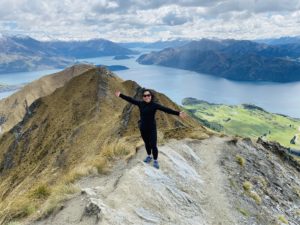
Feeling exhilarated to be at the peak! Roys Peak in South Island, New Zealand
In medicine, the clinician-educator term refers to, “a physician whose primary role is caring for patients and who has formally incorporated educational principles and scholarship into her/ his job description.” These physicians distinguish themselves from other clinicians by, “using evidence-based educational constructs to teach around patient illness and wellness, and converting those constructions and innovations into scholarship.” (Acad Med 2018; 98: 1764)
Harvard Macy Institute’s program for postgraduate trainees is one way to gain theoretical and practical skills towards a clinician-educator career. I had the privilege of attending last month. This three-day intensive program is paired with a year-long scholarly project in medical education and serves as an entry into the Harvard Macy community. I walked away from the course feeling excited and inspired. I’d like to share some highlights of what I learned from the course and about myself.
What I learned from the course
- How to turn innovative ideas into scholarship
Beckman and Cook (Med Teach 2007; 29:210) is a must-read for anyone interested in medical education! These authors describe a three-step approach to designing scholarly education projects grounded in the theoretical basis of Boyer and Glassick: 1. Refine the study question, 2. Identify design and methods, and 3. Outcomes. In particular, Kirkpatrick’s outcomes hierarchy has been invaluable in developing targeted outcomes.
- Practical tips for advancing my scholarly project
I am forever grateful to my project group with mentors Alan Leichtner and Arielle Langer, and members Yakira, Christina, and Larissa. Not only were we a powerhouse team of #WomeninMedicine (and Alan), but we shared thoughtful feedback on each of our projects and practical tips for success. Arielle would often emphasize celebrating the small wins; an embrace of the small advances of our work.
- Ways to seek training in medical education
In addition to training at the Harvard Macy Institute, we discussed ways to seek out educator development opportunities at our own institutions (for example, a medical education residency track). Coursework is also available at the Preceptor Education Program for Health Professionals and Students. And lastly, fellowship training in medical education also exists at Stanford and Rabkin/Beth Israel Deaconess Medical Center.
What I learned about myself
- How I learn and teach
I learned that I have an accommodating learning style (a combination of concrete experience and active experimentation; Kolb learning style inventory) and an apprenticeship perspective on teaching (Teaching Perspectives Inventory).
- The joy of micro-teaching
I taught a micro-teaching session on ‘how to run a marathon’ with my group members pretending to be runners. It was an energizing exercise that included the teaching segment being recorded and then viewed by me for self-reflection and by the group for feedback. I learned that my bubbly energy becomes much more magnified with enthusiastic learners.
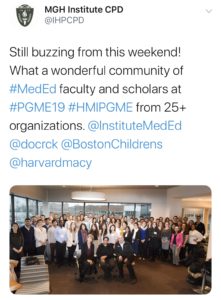 In addition to the highlights noted above, I think what makes the Harvard Macy Institute so special are the people; the community of scholars and faculty who share boundless passion for medical education. Sometimes the journey toward becoming a clinician-educator can feel like scaling a 1586-meter summit. But with the guidance and mentorship of my Harvard Macy community, I know we will all reach the peak together.
In addition to the highlights noted above, I think what makes the Harvard Macy Institute so special are the people; the community of scholars and faculty who share boundless passion for medical education. Sometimes the journey toward becoming a clinician-educator can feel like scaling a 1586-meter summit. But with the guidance and mentorship of my Harvard Macy community, I know we will all reach the peak together.
I would love to hear from trainees and faculty passionate about medical education! Feel free to post a comment below or tweet at me UeFrances.

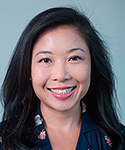
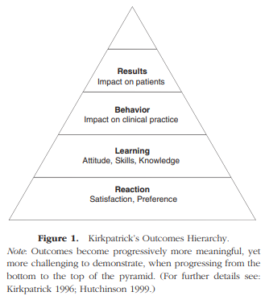
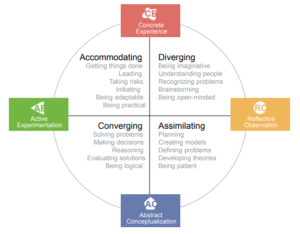


Thank you, Dr. Ue, for sharing the details of your learning experience in the Harvard Macy Institute program for postgraduate trainees and your suggestions for further learning in this area. I, too, took part in a Harvard Macy Institute program in the 1990s, and was similarly inspired by my colleagues, our teachers, and the educators’ curriculum.
I would like to add to your suggestions for other ‘educator development opportunities’, the Academy of Communication in Healthcare (info@achonline.org, http://www.achonline.org). I found that the Macy and ACH programs interacted to facilitate my learning to become a medical educator.
Wishing you and your young colleagues as you enter this fascinating and vitally important field in medicine,
Constance Keefer, MD
Faculty, Brazelton Touchpoints Center, Boston Children’s Hospital and
Pediatric Newborn Medicine, Brigham and Women’s Hospital
Thanks Dr. Keefer for your suggestions on development opportunities! Wonderful to hear from another member of the MedEd community.
Cheers,
Frances
Great job, Frances! I too did this program as a chief resident at CHA back in 2016 and it was transformative for me, as it really got me to thoughtfully launch my curriculum in clinic EMR optimization. Really glad to see your piece out there 🙂